Introduction

Early puppy training plays a crucial role in setting the foundation for good behavior throughout a dog's life. By starting training early on, dogs learn important skills, behaviors, and socialization techniques that shape their future behavior. Training during the puppy stage is essential for their mental and emotional development.
Setting the foundation for good behavior brings numerous benefits to both puppies and their owners. Properly trained puppies are more likely to be well-behaved, obedient, and adaptable to various situations. They are also less likely to develop behavioral issues or engage in destructive behaviors. This early training helps foster a strong bond between puppies and their owners and creates a positive and harmonious living environment.
Understanding the developmental stages of puppies is fundamental for effective training. Neonatal stage experiences can have a lasting impact on a puppy's behavior. Socialization is another crucial aspect of puppy training, as it exposes them to different people, animals, and environments.
In this blog, we will explore the importance of teaching basic commands and obedience training to young puppies. We will discuss positive reinforcement techniques that can be used during this stage of training.
Crate training and housebreaking are also crucial parts of early puppy training. Establishing a routine with crate training ensures that puppies have a safe space while helping prevent accidents in the house. We will provide tips and strategies for successful housebreaking in this article.
Behavioral issues may arise during puppyhood, but they can be effectively addressed through proper training methods. We will discuss common behavioral issues in puppies and provide strategies for managing and correcting these behaviors.
Proper socialization techniques are vital for ensuring that puppies grow up well-adjusted with positive interactions with other dogs and people. Exposing them to various environments and stimuli from an early age helps build their confidence.
Selecting the right tools and equipment is essential when it comes to early puppy training. We will explore the necessary equipment needed for effective training sessions.
Consistency in training methods and utilizing positive reinforcement are key principles for successful puppy training. We will delve into the role of consistency and how positive reinforcement techniques contribute to long-term behavioral success.
In conclusion, early puppy training sets the foundation for good behavior and is crucial for a dog's overall development. By implementing proper training methods, owners can foster well-behaved and obedient dogs. Continued training throughout a dog's life ensures their behavior remains positive and helps strengthen the bond between dogs and their owners. In our next section, we will provide additional tips and resources for continued training success.
Importance of early puppy training

Early puppy training is of utmost importance in laying the foundation for good behavior. By starting training as soon as possible, owners can teach their puppies proper manners and prevent undesirable behaviors from developing.
Training at a young age helps puppies learn basic commands, such as sit, stay, and come. It also introduces them to the concept of obedience and establishes boundaries within the household. In addition, early training allows puppies to become familiar with different environments and social situations, enhancing their adaptability and reducing anxiety.
Moreover, early puppy training plays a crucial role in preventing behavioral issues in the future. By addressing problem behaviors promptly, owners can shape their puppy's behavior positively and instill good habits from the start.
Overall, investing time and effort into early puppy training sets the stage for a well-behaved and socially adjusted adult dog.
Benefits of setting the foundation for good behavior

Setting a strong foundation for good behavior in puppies is crucial for their long-term development and happiness. By investing time and effort into early puppy training, owners can enjoy several benefits. Firstly, it establishes clear boundaries and expectations, helping puppies understand what behaviors are desirable and acceptable. This promotes a harmonious relationship between the puppy and owner. Additionally, early training enhances communication skills between the puppy and its human companions, fostering a strong bond based on trust and understanding. Furthermore, setting the foundation for good behavior reduces the likelihood of future behavioral issues, saving both time and stress in the long run. Overall, early puppy training sets the stage for a well-behaved and balanced dog.
Understanding the Developmental Stages of Puppies

Puppies go through various developmental stages as they grow, and understanding these stages is crucial for effective training. The neonatal stage, which lasts from birth until around two weeks, is characterized by puppies relying solely on their mother and littermates for nourishment and warmth. During this period, their sensory abilities are limited.
Socialization becomes a significant factor in puppy training around the age of three to fourteen weeks. This is when puppies become more curious about the world around them and are most receptive to new experiences. Proper socialization during this stage plays a vital role in shaping their behavior throughout life.
By understanding the developmental stages of puppies, trainers can tailor their approach to each stage's specific needs and fully harness the potential for learning. This ensures that early training sets a solid foundation for good behavior as puppies grow into well-adjusted adult dogs.
Neonatal stage and its impact on behavior
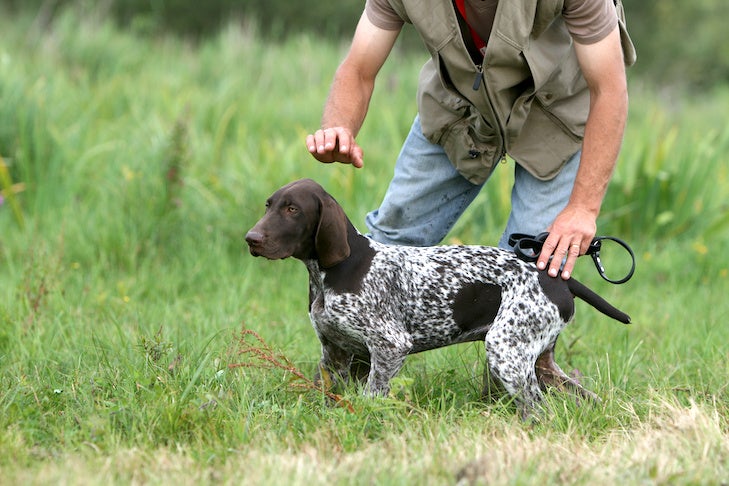
During the neonatal stage, which lasts from birth to around two weeks of age, puppies are highly dependent on their mother and littermates for survival. At this stage, their behavior is instinctual and primarily driven by their need for nourishment, warmth, and safety. They spend most of their time sleeping and nursing.
The neonatal stage plays a crucial role in shaping a puppy's behavior as they grow older. Lack of proper care, nurturing, or early socialization during this stage can result in behavior problems later in life. Puppies who do not receive adequate attention or exposure to gentle handling may develop fear or aggression towards humans or other animals.
It is essential for breeders and owners to provide a nurturing environment during the neonatal stage to promote healthy development and positive socialization. This early care lays the foundation for good behavior and sets the stage for successful training later on.
Socialization and its role in puppy training

Socialization plays a crucial role in puppy training by helping them develop positive relationships with other dogs and humans. It involves exposing them to various environments, people, and situations to ensure they feel comfortable and confident in different settings. Through socialization, puppies learn to navigate new experiences without fear or anxiety.
Proper socialization during the early stages of a puppy's life helps prevent behavioral issues later on. It teaches them appropriate ways to interact with others and builds their confidence. Additionally, well-socialized puppies are more likely to be friendly, calm, and well-behaved throughout their lives.
To incorporate socialization into puppy training, owners should expose their puppies to different people, animals, places, sounds, and objects. This can be done through walks in busy areas, visits to parks or dog-friendly events, and supervised playdates or interactions with other dogs. Positive experiences during socialization will set the foundation for good behavior in various situations.
Basic Commands and Obedience Training

Teaching basic commands and obedience training is an essential aspect of early puppy training. By instilling these fundamental skills, owners can establish a strong foundation for their puppies' future behavior.
The first step in this process is teaching essential commands such as "sit," "stay," "come," and "leave it." These commands not only ensure that the puppy understands and follows instructions but also improve their overall behavior and responsiveness.
Positive reinforcement techniques, such as rewarding the puppy with treats or praise, are highly effective in teaching these commands. This method encourages the puppy to associate desirable behaviors with positive outcomes, making them more likely to repeat them in the future.
By implementing basic command training, owners can effectively communicate with their puppies, promote obedience, and set the stage for further advanced training as they grow older.
Teaching essential commands
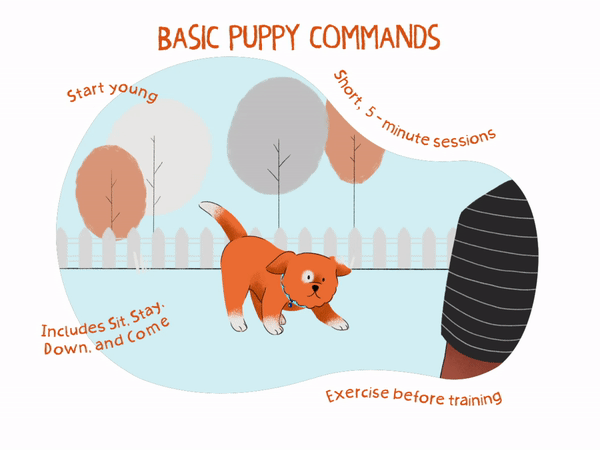
Teaching essential commands to puppies is a crucial part of their early training. These commands lay the foundation for good behavior and communication between the puppy and their owner. Two of the most important commands to teach are "sit" and "stay." To teach "sit," gently press down on the puppy's hindquarters while saying the command, and reward them when they comply. For "stay," instruct the puppy to sit, then take a step back and hold your hand up as a stop signal. Gradually increase the distance while rewarding them for staying in place. Consistency and repetition are key to successfully teaching these commands, ensuring that your puppy understands what is expected of them in various situations.
Positive reinforcement techniques

Positive reinforcement is a highly effective technique used in early puppy training to encourage and reinforce desired behaviors. This method involves rewarding puppies with praise, treats, or toys when they exhibit good behavior.
The key to using positive reinforcement successfully is timing. It's crucial to provide the reward immediately after the desired behavior is performed, so that the puppy can associate the action with the reward. This helps them understand what behavior is expected of them.
Consistency is also important when implementing positive reinforcement. By consistently rewarding good behavior, puppies learn that it leads to positive outcomes, which encourages them to repeat those behaviors in the future.
Positive reinforcement not only helps puppies learn basic commands and obedience, but it also strengthens the bond between puppy and owner. It creates a positive and enjoyable training experience that fosters trust and cooperation.
Remember, during early puppy training, patience is key. Each puppy learns at their own pace, so be sure to celebrate even small successes along the way. With consistency and positive reinforcement techniques, you can set your puppy up for a lifetime of good behavior.
Crate Training and Housebreaking

The importance of crate training cannot be overstated when it comes to early puppy training. Crate training provides a safe and secure space for puppies, giving them a sense of security and helping to prevent destructive behaviors. It also plays a key role in housebreaking.
When it comes to housebreaking, consistency is key. Establishing a routine and taking your puppy outside regularly will help them learn where and when to go potty. Crate training can be used as a tool in this process, as puppies naturally avoid soiling their sleeping areas. By using the crate strategically, you can help your puppy develop good bathroom habits.
Remember to always reward your puppy for going potty in the designated area and be patient during the housebreaking process. With time, consistency, and positive reinforcement, your puppy will learn proper bathroom etiquette and become a well-behaved companion.
The importance of crate training

Crate training is a crucial aspect of early puppy training. It provides numerous benefits for both the puppy and their owner.
Crate training offers a safe and secure space for the puppy when they are left alone or during bedtime. It becomes their den, which appeals to their natural instincts as den animals. Not only does it provide them with a sense of security, but it also helps prevent destructive behaviors and ensures their safety.
Additionally, crate training aids in housebreaking by teaching the puppy to hold their bladder and bowels until they are taken outside. The confined space helps establish a routine for potty breaks and prevents accidents inside the house.
Moreover, crate training facilitates transportation and travel, as puppies who are accustomed to crates are more comfortable during car rides or visits to the veterinarian.
Overall, crate training is an essential tool that sets the foundation for good behavior and promotes a well-adjusted and disciplined puppy.
Housebreaking tips and strategies
Housebreaking is an essential aspect of early puppy training that sets the foundation for good behavior. To effectively housebreak a puppy, consistency and patience are key. Here are some helpful tips and strategies:
- Establish a routine: Set regular feeding times and take your puppy outside immediately after meals to encourage regular bowel movements.
- Supervision and confinement: Keep a close eye on your puppy and limit their access to certain areas of the house. Use crates or baby gates to restrict their movement when you can't supervise them.
- Take them outside frequently: Puppies have small bladders, so take them outside every 1-2 hours, as well as after naps, playtime, and meals.
- Positive reinforcement: Praise your puppy and offer treats when they eliminate in the appropriate spot outside. This helps associate good behavior with rewards.
- Accidents happen: If your puppy has an accident indoors, don't scold or punish them. Instead, clean it up using an enzymatic cleaner to eliminate any lingering scent that may attract them back to the same spot.
By following these housebreaking tips and strategies consistently, you can teach your puppy proper bathroom habits and promote good behavior in the long run.
Addressing Behavioral Issues

Common behavioral issues in puppies can arise as they navigate through their developmental stages. Some of these issues include biting, chewing, excessive barking, jumping up on people, and separation anxiety. It is important for puppy owners to address these issues early on to prevent them from becoming ingrained habits.
To effectively address behavioral issues in puppies, it is essential to use positive reinforcement techniques. This means rewarding good behavior with treats, praise, and affection while ignoring or redirecting unwanted behaviors. Consistency is key when implementing these techniques, as puppies thrive on routine and clear boundaries.
Seeking professional help from a certified dog trainer or behaviorist is also recommended if the behavioral issues persist or escalate. They can provide guidance specific to your puppy's needs and help you establish a customized training plan.
By addressing and correcting behavioral issues early on, puppy owners can set their furry friends up for a lifetime of good behavior and a harmonious bond between them.
Common behavioral issues in puppies
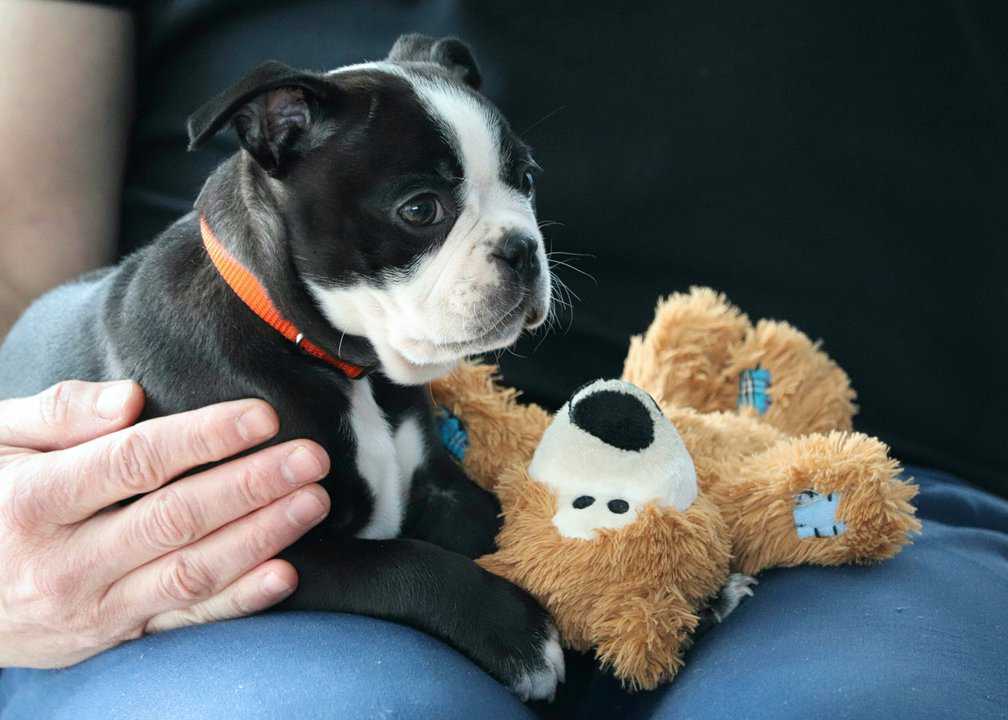
Common behavioral issues in puppies can arise as they begin to explore the world around them. Some common behavioral issues may include biting or nipping, chewing on inappropriate objects, excessive barking, jumping on people, or having accidents indoors. It is important for puppy owners to understand that these behaviors are normal and can be addressed through proper training and guidance.
Puppies may bite or nip as a form of play or exploration, but it is crucial to teach them appropriate boundaries. Chewing on objects helps relieve teething discomfort, but redirecting their chewing behavior towards appropriate toys can help prevent damage to furniture or other items. Excessive barking can be a sign of boredom or anxiety and can be managed through mental and physical stimulation. Jumping can be discouraged by teaching puppies alternative greetings such as sitting or settling down before receiving attention. Lastly, accidents indoors can be resolved through consistent housebreaking training and establishing a regular routine for feeding and bathroom breaks.
By addressing these common behavioral issues early on, owners can set a foundation for good behavior in their puppies. Consistency in training techniques and positive reinforcement are key to ensuring long-term success in molding their puppy's behavior.
Effective strategies for addressing these issues

To address behavioral issues in puppies, it is important to implement effective strategies that promote positive behavior and discourage unwanted behaviors. One effective strategy is to establish clear rules and boundaries for the puppy. Consistent reinforcement of these rules helps the puppy understand what behaviors are acceptable.
Another strategy is redirecting unwanted behaviors by providing alternative activities or toys that are more appropriate for the puppy to focus on. For example, if a puppy is chewing on furniture, redirecting them towards a chew toy can help prevent further damage.
Positive reinforcement techniques such as rewards and praise for desired behavior also play a crucial role in addressing behavioral issues. By rewarding good behavior, the puppy learns what actions are desirable and will be more likely to repeat them.
Lastly, seeking guidance from a professional dog trainer or behaviorist can provide further assistance in addressing specific behavioral issues. They can offer personalized advice and tactics based on the individual puppy's needs. By implementing these effective strategies, pet owners can help their puppies develop good behavior habits that will last into adulthood.
Proper Socialization Techniques
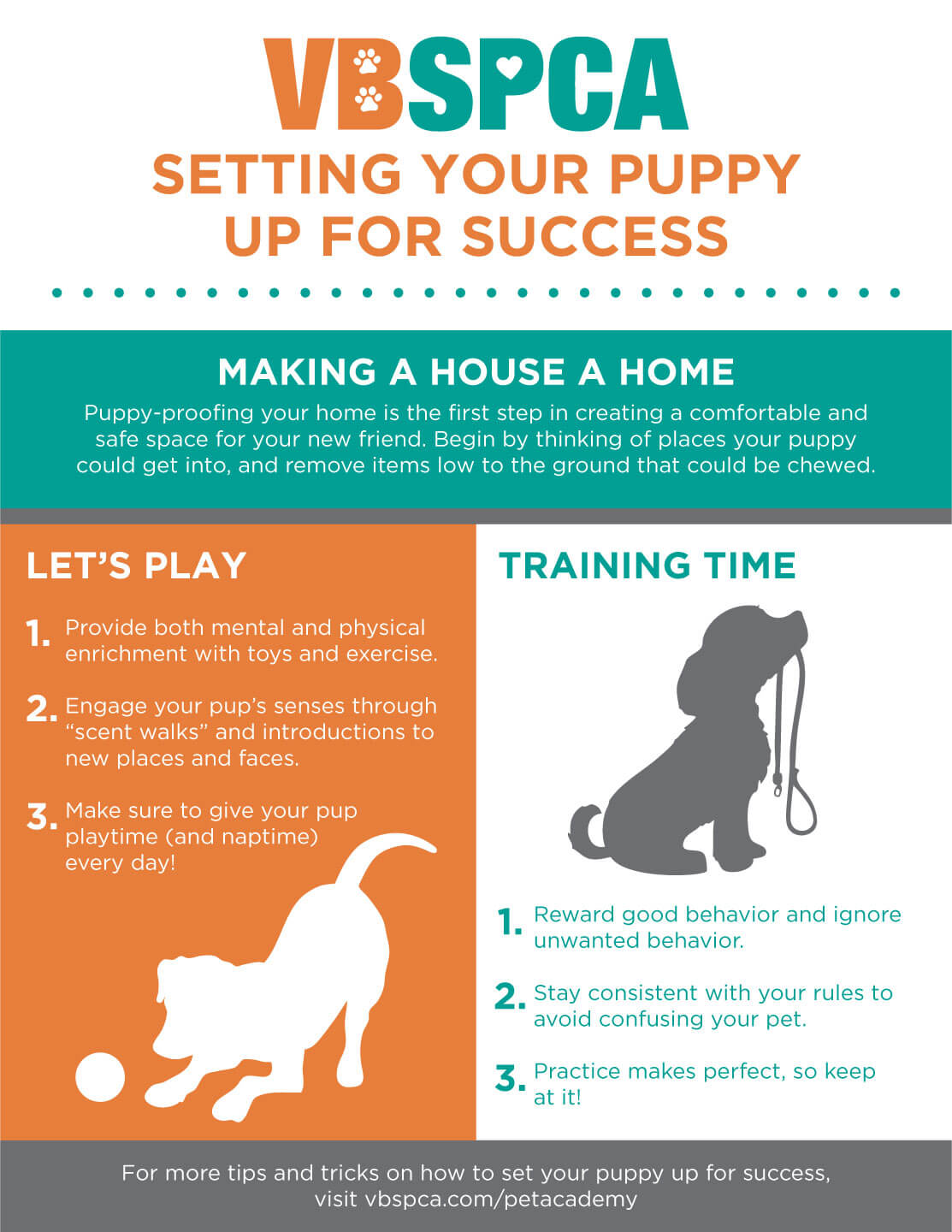
Proper socialization techniques play a crucial role in early puppy training to ensure the development of well-rounded and confident dogs. Exposing puppies to various environments and stimuli from an early age helps them become familiar and comfortable with different situations. This includes introducing them to different sounds, surfaces, objects, and people.
To ensure positive interactions with other dogs and people, it is important to create controlled and supervised opportunities for socialization. Controlled play sessions with well-behaved adult dogs can help teach puppies appropriate behavior and provide valuable social skills. Similarly, exposing puppies to different types of people, such as children, men, women, and individuals with different appearances or disabilities, helps them become comfortable in various social settings.
By implementing these proper socialization techniques, puppy owners can set a solid foundation for their furry friends' good behavior and overall well-being.
Exposing puppies to various environments and stimuli
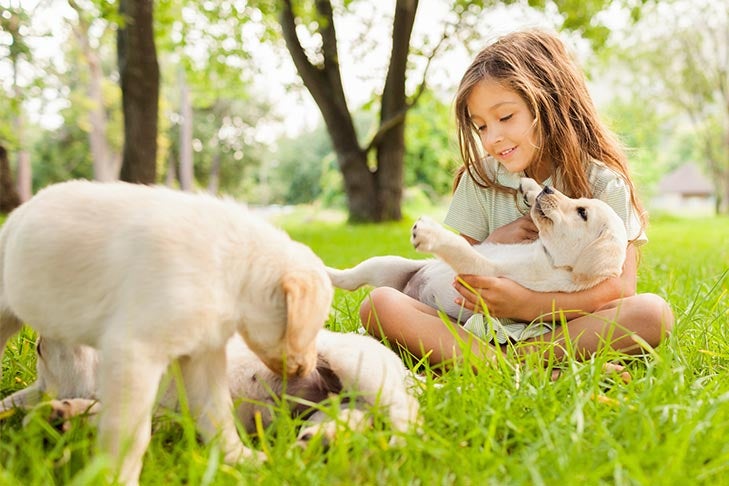
Exposing puppies to various environments and stimuli is a crucial aspect of early puppy training. By introducing them to different situations, sounds, sights, and smells, you can help them become well-rounded and adaptable adult dogs. This exposure helps them build confidence and reduces the likelihood of fear or anxiety-related behavior issues.
Taking your puppy on outings to parks, busy streets, or other public places allows them to experience new surroundings and encounter different people and animals. Gradually exposing them to mild distractions, such as a vacuum cleaner or other household noises, will help desensitize them over time.
Introducing puppies to various stimuli in a controlled manner is essential. It teaches them how to react calmly and appropriately in different situations. This exposure should always be positive, ensuring that your puppy associates these experiences with pleasantness rather than stress or fear.
Remember to gradually increase the challenges as your puppy becomes more comfortable with different environments and stimuli. Building their confidence through exposure will set a strong foundation for good behavior throughout their lives.
Ensuring positive interactions with other dogs and people

When it comes to early puppy training, ensuring positive interactions with other dogs and people is crucial. Socialization plays a significant role in shaping a puppy's behavior and temperament. By exposing puppies to various environments and stimuli, they can become more comfortable and confident in different social situations.
To promote positive interactions, it is important to introduce your puppy to other dogs and people gradually, using controlled environments such as training classes or supervised playdates. Encourage gentle and calm behavior, rewarding your puppy for appropriate interactions. It's essential to monitor their body language and intervene if necessary to prevent any negative experiences.
Remember, every interaction is an opportunity for your puppy to learn and grow. By providing positive experiences with other dogs and people, you are setting the foundation for good behavior and a well-adjusted adult dog.
Training Tools and Equipment

Essential training tools and equipment play a crucial role in early puppy training. One of the must-have tools is a well-fitting collar or harness, which ensures control and safety during walks. A lightweight and sturdy leash is also necessary for guiding the puppy during outdoor training sessions. Training treats are invaluable for positive reinforcement, motivating puppies to learn and perform commands correctly. Another useful tool is a clicker, which can be used to mark desired behaviors and signal to the puppy that a reward is coming. Additionally, interactive toys and puzzle games can help keep puppies mentally stimulated and prevent destructive behavior. It's important to choose the right equipment that suits your individual needs and is appropriate for your puppy's size, breed, and temperament.
Essential training tools for early puppy training

When it comes to early puppy training, having the right tools can make a big difference in setting the foundation for good behavior. Here are some essential training tools that can help in the process:
- Dog Treats: Treats are a valuable tool for positive reinforcement. Use small, soft treats that your puppy loves as rewards for good behavior during training sessions.
- Clicker: A clicker is a small handheld device that makes a distinct clicking sound. It is used to mark the exact moment when your puppy performs a desired behavior, making it easier for them to understand what they are being rewarded for.
- Leash and Collar: A leash and collar are necessary for teaching your puppy to walk on a leash and follow commands such as "heel" or "come." Start with a lightweight collar and a shorter leash before transitioning to longer ones as your puppy grows.
- Crate or Playpen: A crate or playpen provides a safe space for your puppy and helps with housebreaking and preventing destructive behavior when you cannot supervise them.
- Training Pads: Training pads are useful during housebreaking to teach your puppy where it is acceptable to eliminate indoors initially.
Remember, always choose high-quality and safe tools that are appropriate for your puppy's size and breed. With the right tools, you'll be better equipped to train your puppy effectively and set them up for success in the long run.
Choosing the right equipment for individual needs
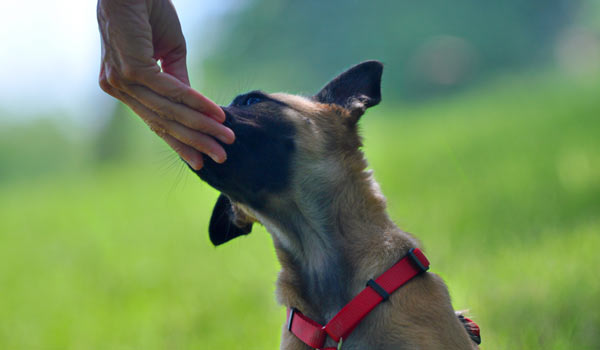
When it comes to choosing the right equipment for early puppy training, it's important to consider the individual needs of your pup. Every dog is unique and may respond differently to various tools and equipment.
One essential tool for training is a leash that is suitable for your puppy's size and strength. A sturdy and comfortable harness can also be helpful, especially for dogs that tend to pull or have neck sensitivities. Additionally, a clicker can be a valuable tool for reinforcing positive behaviors.
It's crucial to consult with a professional trainer or veterinarian to determine the best equipment options for your puppy's specific needs. They can provide guidance based on factors such as breed, age, and training goals.
By selecting the right equipment tailored to your pup, you can ensure that they receive effective and safe training experiences.
Consistency and Positive Reinforcement

Consistency and positive reinforcement are key factors in ensuring successful puppy training. Consistency refers to the need for a reliable routine and a consistently enforced set of rules. This helps puppies understand expectations and builds a strong foundation for good behavior. By consistently rewarding desired behaviors and redirecting or ignoring undesired behaviors, owners can effectively communicate with their puppies.
Positive reinforcement involves using rewards such as treats, praise, or play to encourage desired behaviors. This type of training creates a positive association in the puppy's mind, making them more likely to repeat those behaviors in the future. It is important to remember that punishment or harsh methods can lead to fear and anxiety in puppies, hindering their progress.
By being consistent with their training methods and always using positive reinforcement, owners can set their puppies up for success and establish a strong bond based on trust and respect.
The role of consistency in puppy training

Consistency is a key factor in successful puppy training. When it comes to teaching your furry friend good behavior, consistency helps them understand what is expected of them. By providing consistent rules and routines, puppies are able to develop a clear understanding of boundaries and expectations.
Consistency in training means using the same commands, reinforcement techniques, and expectations every time. This ensures that your puppy learns and retains the information effectively. When everyone in the household follows the same training methods consistently, it prevents confusion or mixed messages that can hinder their progress.
Moreover, consistency applies not only to commands and rules but also to scheduling and routines. Feeding, walking, and playtime should all be done on a consistent schedule to establish a sense of predictability for your puppy.
By maintaining consistency in all aspects of training, you create an environment that fosters a strong foundation for good behavior. Your puppy will quickly learn what behaviors are acceptable and what are not, making the training process smoother and more effective overall.
Utilizing positive reinforcement for effective results
Positive reinforcement is a powerful tool when it comes to training puppies and achieving effective results. By utilizing positive reinforcement techniques, puppy owners can encourage their furry companions to exhibit desired behaviors. This involves rewarding puppies with treats, praise, or playtime whenever they demonstrate good behavior or successfully follow commands.
The key to using positive reinforcement effectively is timing. It's important to reward the puppy immediately after they exhibit the desired behavior, so they can make the connection between their actions and the positive outcome. Consistency is also crucial; rewarding the puppy consistently for good behavior will reinforce these behaviors over time.
Positive reinforcement strengthens the bond between puppies and their owners, as it creates a positive and trusting relationship based on rewards and encouragement rather than punishment. By focusing on reinforcing desirable behaviors, puppy owners can set a solid foundation for good behavior that will stay with their furry friends throughout their lives.
Conclusion

The early training of puppies lays the foundation for their behavior and overall development. It is of utmost importance to start training puppies from a young age to ensure that they grow up to be well-behaved and obedient companions.
By setting the groundwork for good behavior, owners can benefit from a harmonious and enjoyable relationship with their furry friends. Early puppy training helps address behavioral issues, teaches essential commands, and assists in socializing them properly.
Consistency and positive reinforcement are key elements in successful puppy training. Utilizing the right tools and equipment also plays a significant role in shaping their behavior positively.
In conclusion, investing time and effort into early puppy training yields numerous long-term benefits. It not only helps prevent behavioral problems but also creates a strong bond between pet and owner. Continued training throughout their lives ensures that they remain well-mannered and happy members of the family.
The long-term benefits of early puppy training

Early puppy training plays a crucial role in setting a foundation for good behavior in dogs. By investing time and effort during their developmental stages, owners can reap long-term benefits in the form of well-behaved and obedient pets. Dogs who receive early training are more likely to exhibit proper socialization skills, making them comfortable around other animals and people. Additionally, they learn essential commands and obedience skills that enable them to navigate various situations with ease. This training also helps address common behavioral issues, such as excessive barking or destructive chewing. Consistency and positive reinforcement techniques used during early training contribute to the formation of desirable behaviors, making it easier for owners to manage their dogs throughout their lives. With the right tools and techniques, early puppy training sets the stage for a lifetime of positive interactions and behaviors for both dogs and their owners.
Tips and resources for continued training success
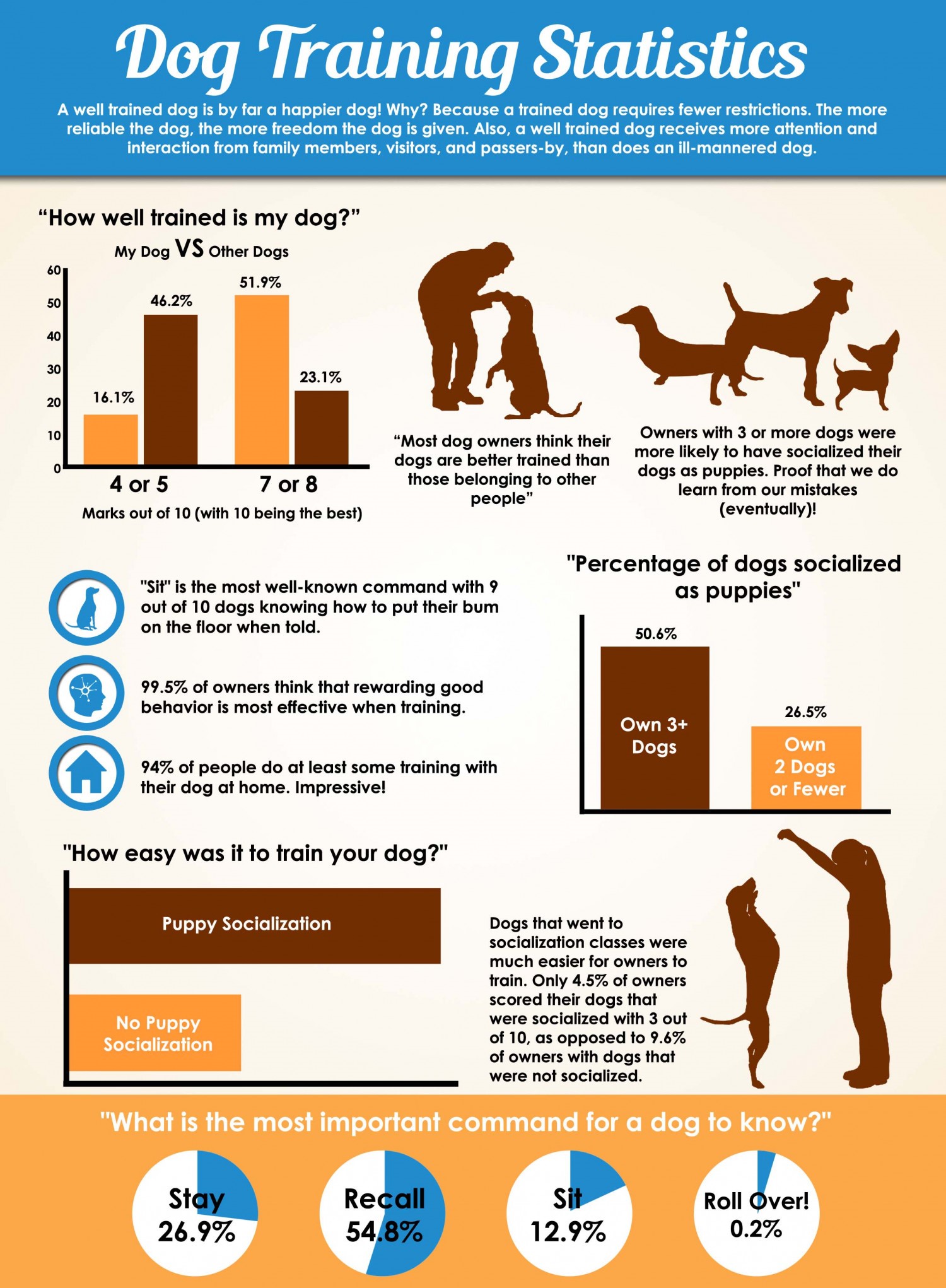
To ensure continued training success with your puppy, here are some helpful tips and resources:
- Consistency is key: Be consistent in your commands, expectations, and rewards. This will help your puppy understand what is expected of them and reinforce good behavior.
- Set achievable goals: Break down training into small, attainable goals. This will make the process less overwhelming for both you and your puppy.
- Seek professional guidance: Consider enrolling your puppy in a formal obedience class or hiring a professional dog trainer. They can provide expert advice, guidance, and personalized training sessions.
- Use online resources: There are countless online tutorials, videos, and forums dedicated to dog training. Take advantage of these valuable resources to learn new techniques and get support from experienced trainers.
- Practice patience: Remember that puppies learn at different paces. Patience is essential during the training process. Celebrate small victories and remain committed to consistency and positive reinforcement.
By following these tips and utilizing available resources, you can continue to build on the foundation set during early puppy training and ensure long-term behavioral success for your furry friend.




0 Comments